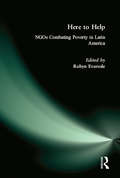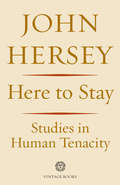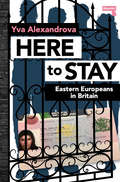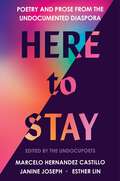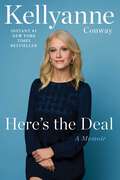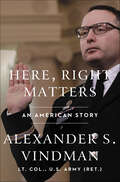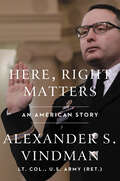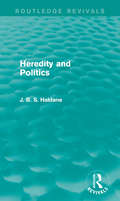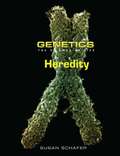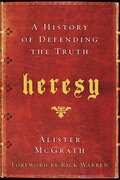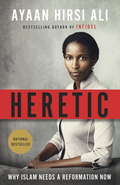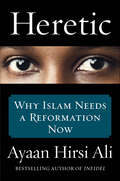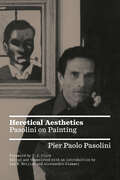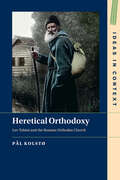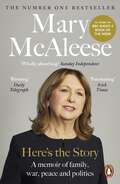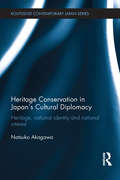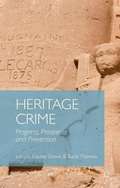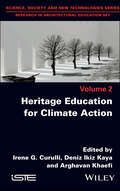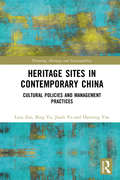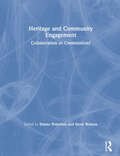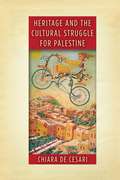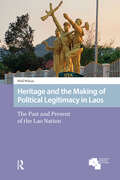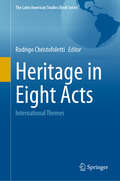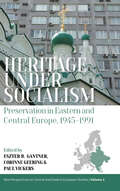- Table View
- List View
Here to Help: NGOs Combating Poverty in Latin America
by Robyn EversoleOver six billion dollars in developmental assistance is funneled annually through non-governmental organizations (NGOs), yet little is understood about the nature of their relationship with communities and the real impact of their work. This book examines what role NGOs really play in fighting poverty in Latin America. Expert NGO professionals and scholars explore grass-roots relationships between international religious and secular NGOs and poor communities. They probe the power structures, cultural assumptions, dangers and possibilities that underlie NGOs' work. While fighting poverty is the mission of many NGOs, most are aware that they often fail to make things better, and, in fact, may make things worse. By providing a forum for Northern and Southern NGOs, donors, scholars, and poor people themselves, this book explores the causes and cures of poverty, and presses at the boundaries of our understanding of participatory development. It identifies both internal and external factors that influence the success of NGO projects, and moves beyond standard best-practice theory to probe more deeply the relationships that underlie poverty and how these relationships can be shifted to achieve solutions.
Here to Stay (Tesoro Bks.)
by John HerseyIn Here to StayJohn Hersey tells of episodes in the past twenty years in which Man has courageously risen above desperate situations and shown his determination to survive despite the threats of the nuclear age. Mr. Hersey first tells the story of an old lady marooned on a rooftop amidst floods caused by a hurricane. He ends with his famous Hiroshima, the story of the survivors of the first atomic bombing, written from personal investigation, with horrifying detail and compassionate indignation. Between these two pieces we read of John Kennedy’s heroism in rescuing the crew of his PT boat, sunk by the Japanese, seventeen years before he became President; a Jew’s suffering in Auschwitz; a crippled G.I.’s difficulties in adjusting himself to civilian life; the rehabilitation of a soldier paralyzed with fright; the adventures of two Poles who survived persecution; and a most moving account of an escape from Hungary in 1956. All John Hersey’s books have had a serious purpose. A Bell for Adanodrew attention to Italy’s plight; The Wall studied the Polish Jews’ struggle against tyranny; The War Lover exposed the war mentality;The Child Buyershowed up the exploitation of talent. Here to Stayis a stirring reminder of our inherent ability to meet the challenge of extinction which now faces the world.
Here to Stay: Eastern Europeans in Britain
by Yva AlexandrovaBulgarian writer and immigration expert Yva Alexandrova tells the story of Eastern European migrants in the UK, and argues for a more just, humane and compassionate immigration system.The arrival of Eastern European migrants to the UK after the enlargement of the EU in 2004 and 2011 was one of the key social transformations of the last twenty years in this country. Yet whilst reporting on this has focused mainly on the impact of immigration on the UK, and has been constructed of racist vox-pops and sensationalist political debate, there has been very little research on, and even less insight into, the experiences of the migrants themselves. Drawing on personal experience, interviews and research, Yva Alexandrova tells hers and the stories of other Eastern Europeans that came to the UK, and shows how attitudes to immigration have changed in the last twenty years in the wake of Brexit and a new wave of nativism that has swept across Britain. She argues that both the right and the left have made political compromises on migration, and makes a passionate and vivid argument for fair and just migration that is grounded in people&’s lived experiences and aspirations, and not in political expediency, as integral to progressive movements today. At a time when racism, xenophobia and nationalism dominate political discussion in the UK and around the world, Left Out: Eastern Europeans in Britain tells the stories of people who are rarely seen in debates on immigration.
Here to Stay: Poetry and Prose from the Undocumented Diaspora
by Janine Joseph Marcelo Hernandez Castillo Esther LinA lush tapestry of poetry and prose, Here to Stay is an invitation to engage with a new field of contemporary American poetry. “I cannot separate my work from my undocumented identity.” —Aline MelloFrom the indomitable writers and activists Janine Joseph, Esther Lin, and Marcelo Hernandez Castillo comes an anthology gathering some of the best work from currently and formerly undocumented poets, as well as poets from mixed status families from across the undocumented diaspora in America. Here to Stay is a collection of honest, searing, and evocative poems interspersed with short personal narratives. Deeply intimate, these works explore how to exist in the space between the familiar and the unknown, between the safety of silence and the desire to share. Highlighting the significant insights of undocumented poets, this brilliant compendium challenges misconceptions of what it means to live and write as an undocumented person in modern America.Beautiful, poignant, and timely, this must-read collection is a rich and essential new chapter in the ongoing story of the eclectic immigrant experience and the United States itself.
Here's the Deal: A Memoir
by Kellyanne ConwayAmong the Trump era’s savviest insiders, one name stands especially tall: Kellyanne. As a highly respected pollster for corporate and Republican clients and a frequent television talk show guest, Kellyanne Conway had already established herself as one of the brightest lights on the national political scene when Donald Trump asked her to run his presidential campaign. She agreed, delivering him to the White House, becoming the first woman in American history to manage a winning presidential campaign, and changing the American landscape forever. Who she is, how she did it, and who tried to stop her is a fascinating story of personal triumph and political intrigue that has never been told…until now. <p><p>In Here’s The Deal, Kellyanne takes you on a journey all the way to the White House and beyond with her trademark sharp wit, raw honesty, and level eye. It’s all here: what it’s like to be dissected on national television. How to outsmart the media mob. How to outclass the crazy critics. How to survive and succeed male-dominated industries. What happens when the perils of social media really hit home. And what happens when the divisions across the country start playing out in one’s own family. <p><p>In this open and vulnerable account, Kellyanne turns the camera on herself. What she has to share—about our politics, about the media, about her time in the White House, and about her personal journey—is an astonishing glimpse of visibility and vulnerability, of professional and personal highs and lows, and ultimately, of triumph. <p> <b>New York Times Bestseller</b>
Here, Right Matters: An American Story
by Alexander VindmanRetired U.S. Army Lieutenant Colonel Alexander Vindman, who found himself at the center of a firestorm for his decision to report the infamous phone call that led to presidential impeachment, tells his own story for the first time. Here, Right Matters is a stirring account of Vindman's childhood as an immigrant growing up in New York City, his career in service of his new home on the battlefield and at the White House, and the decisions leading up to, and fallout surrounding, his exposure of President Trump's abuse of power. 0900, Thursday, July 25, 2019: President Trump called Ukraine’s President Zelensky, supposedly to congratulate him on his recent victory. In the months that followed, the American public would only learn what happened on that call because Alexander Vindman felt duty-bound to report it up the chain of command: that the President of the United States had extorted a foreign ally to damage a political challenger at home. Vindman’s actions and subsequent testimony before congress would lead to Trump’s impeachment and affirm Vindman's belief that he had done the right thing in the face of intense pressure to stay silent. But it would come at an enormous cost, straining relationships with colleagues, superiors, and even his own father, and eventually end his decorated career in the US Army, by a Trump administration intent on retribution. Here, Right Matters is Vindman’s proud, passionate, and candid account of his family, his career, and the moment of truth he faced for his nation. As an immigrant, raised by a father who fled the Soviet Union in pursuit of a better life for his children, Vindman learned about respect for truth throughout his education and military service. As this memoir makes clear, his decision to speak up about the July 25th call was never a choice: it was Vindman’s duty, as a naturalized citizen and member of the armed forces. In the wake of his testimony, he would endure furious partisan attacks on his record and his loyalty. But far louder was the extraordinary chorus of support from citizens who were collectively intent on reaffirming an abiding American commitment to integrity. In the face of a sure-fire career derailment and public excoriation, Vindman heeded the lessons from the people and institutions who instilled in him the moral compass and the courage to act decisively. Like so many other American immigrant families, the Vindmans had to learn to build a life from scratch and take big risks to achieve important goals. Here, Right Matters is about the quiet heroes who keep us safe; but, above all, it is a call to arms for those who refuse to let America betray its true self.
Here, Right Matters: An American Story
by Alexander VindmanRetired U.S. Army Lieutenant Colonel Alexander Vindman, who found himself at the center of a firestorm for his decision to report the infamous phone call that led to presidential impeachment, tells his own story for the first time. Here, Right Matters is a stirring account of Vindman's childhood as an immigrant growing up in New York City, his career in service of his new home on the battlefield and at the White House, and the decisions leading up to, and fallout surrounding, his exposure of President Trump's abuse of power. 0900, Thursday, July 25, 2019: President Trump called Ukraine’s President Zelensky, supposedly to congratulate him on his recent victory. In the months that followed, the American public would only learn what happened on that call because Alexander Vindman felt duty-bound to report it up the chain of command: that the President of the United States had extorted a foreign ally to damage a political challenger at home. Vindman’s actions and subsequent testimony before congress would lead to Trump’s impeachment and affirm Vindman's belief that he had done the right thing in the face of intense pressure to stay silent. But it would come at an enormous cost, straining relationships with colleagues, superiors, and even his own father, and eventually end his decorated career in the US Army, by a Trump administration intent on retribution. Here, Right Matters is Vindman’s proud, passionate, and candid account of his family, his career, and the moment of truth he faced for his nation. As an immigrant, raised by a father who fled the Soviet Union in pursuit of a better life for his children, Vindman learned about respect for truth throughout his education and military service. As this memoir makes clear, his decision to speak up about the July 25th call was never a choice: it was Vindman’s duty, as a naturalized citizen and member of the armed forces. In the wake of his testimony, he would endure furious partisan attacks on his record and his loyalty. But far louder was the extraordinary chorus of support from citizens who were collectively intent on reaffirming an abiding American commitment to integrity. In the face of a sure-fire career derailment and public excoriation, Vindman heeded the lessons from the people and institutions who instilled in him the moral compass and the courage to act decisively. Like so many other American immigrant families, the Vindmans had to learn to build a life from scratch and take big risks to achieve important goals. Here, Right Matters is about the quiet heroes who keep us safe; but, above all, it is a call to arms for those who refuse to let America betray its true self.
Heredity and Politics (Routledge Revivals)
by J. B. HaldaneThis book, first published in 1938, is based on the Muirhead Lectures given at Birmingham University in February and March of 1937. The first half of this book is mainly devoted to an exposition of the principles of genetics, whilst the second half deals with more controversial topics, with the text providing an insight into the ideology of the time. This title will be of interest to students of politics and history.
Heredity: The Science Of Life
by Susan SchaferThis study of macroeconomics combines treatment of opposing theories with a presentation of evidence to point the way toward a reconstructed macro research and policy programme.
Heresy, Literature, and Politics in Early Modern English Culture
by David Loewenstein John MarshallThis interdisciplinary volume of essays brings together a team of leading early modern historians and literary scholars in order to examine the changing conceptions, character, and condemnation of 'heresy' in sixteenth- and seventeenth-century England. Definitions of 'heresy' and 'heretics' were the subject of heated controversies in England from the English Reformation to the end of the seventeenth century. These essays illuminate the significant literary issues involved in both defending and demonising heretical beliefs, including the contested hermeneutic strategies applied to the interpretation of the Bible, and they examine how debates over heresy stimulated the increasing articulation of arguments for religious toleration in England. Offering fresh perspectives on John Milton, Thomas Hobbes, John Locke and others, this volume should be of interest to all literary, religious and political historians working on early modern English culture.
Heresy: A History of Defending the Truth
by Alister E. McGrathIn Heresy, leading religion expert and church historian Alister McGrath reveals the surprising history of heresy and rival forms of Christianity, arguing that the church must continue to defend what is true about Jesus. He explains that remaining faithful to Jesus’s mission and message is still the mandate of the church despite increasingly popular cries that traditional dogma is outdated and restricts individual freedom.
Heretic
by Ayaan Hirsi AliContinuing her very personal journey from a deeply religious Islamic upbringing to a post at Harvard, the brilliant, charismatic and controversial New York Times and Globe and Mail #1 bestselling author of Infidel and Nomad makes a powerful plea for an Islamic Reformation as the only way to end the horrors of terrorism and sectarian warfare and the repression of women and minorities. Today, the world's 1.6 billion Muslims can be divided into a minority of fundamentalists, a majority of observant "daily" Muslims and a few dissidents who risk their lives by questioning their own religion. But there is only one Islam and, as Ayaan Hirsi Ali argues, there is no denying that some of its key teachings--like the subordination of women and the duty to wage holy war--are incompatible with the values of a free society. For centuries it has seemed as if Islam is immune to change. But Hirsi Ali has come to believe that a "Reformation"--a revision of Islamic doctrine aimed at reconciling the religion with modernity--is now at hand, and may even have begun. The Arab Spring may now seem like a political failure. But its challenge to traditional authority revealed a new readiness--not least by Muslim women--to think freely and to speak out. Ayaan Hirsi Ali argues that ordinary Muslims throughout the world want change. Courageously challenging the fundamentalists, she identifies 5 key amendments to Islamic doctrine that must be made in order to set Muslims free from their 7th-century chains. Interweaving her own experiences, historical analogies and powerful examples from contemporary Islamic societies and cultures, Heretic is not a call to arms, but a passionate plea for peaceful change and a new era of toleration.
Heretic: Why Islam Needs a Reformation Now
by Ayaan Hirsi AliContinuing her journey from a deeply religious Islamic upbringing to a post at Harvard, the brilliant, charismatic and controversial New York Times and Globe and Mail #1 bestselling author of Infidel and Nomad makes a powerful plea for a Muslim Reformation as the only way to end the horrors of terrorism, sectarian warfare and the repression of women and minorities.Today, she argues, the world’s 1.6 billion Muslims can be divided into a minority of extremists, a majority of observant but peaceable Muslims and a few dissidents who risk their lives by questioning their own religion. But there is only one Islam and, as Hirsi Ali shows, there is no denying that some of its key teachings—not least the duty to wage holy war—are incompatible with the values of a free society. For centuries it has seemed as if Islam is immune to change. But Hirsi Ali has come to believe that a Muslim Reformation—a revision of Islamic doctrine aimed at reconciling the religion with modernity—is now at hand, and may even have begun. The Arab Spring may now seem like a political failure. But its challenge to traditional authority revealed a new readiness—not least by Muslim women—to think freely and to speak out.Courageously challenging the jihadists, she identifies five key amendments to Islamic doctrine that Muslims have to make to bring their religion out of the seventh century and into the twenty-first. And she calls on the Western world to end its appeasement of the Islamists. “Islam is not a religion of peace,” she writes. It is the Muslim reformers who need our backing, not the opponents of free speech.Interweaving her own experiences, historical analogies and powerful examples from contemporary Muslim societies and cultures, Heretic is not a call to arms, but a passionate plea for peaceful change and a new era of global toleration. In the wake of the Charlie Hebdo murders, with jihadists killing thousands from Nigeria to Syria to Pakistan, this book offers an answer to what is fast becoming the world’s number one problem.
Heretical Aesthetics: Pasolini on Painting
by T. J. ClarkFirst collection on filmmaker and poet Pasolini's passion for paintingOne of Europe's most mythologized Marxist intellectuals of the 20th century, Pier Paolo Pasolini was not only a poet, filmmaker, novelist, and political martyr. He was also a keen critic of painting. An intermittently practicing artist in his own right, Pasolini studied under the distinguished art historian Roberto Longhi, whose lessons marked a life-long affinity for figurative painting and its centrality to a particular cinematic sensibility.Pasolini set out wilfully to "contaminate" art criticism with semiotics, dialectology, and film theory, penning catalogue essays and exhibition reviews alongside poems, autobiographical meditations, and public lectures on painting. His fiercely idiosyncratic blend of Communism and classicism, localism and civic universalism, iconophilia and aesthetic "heresy," animated and antagonized Cold War culture like few European contemporaries. This book offers numerous texts previously available only in Italian, each accompanied by an editorial note elucidating its place in the tumultuous context of post-war Italian culture.Prefaced by the renowned art historian T.J. Clark, a historical essay on Pasolini's radical aesthetics anchors the anthology. One hundred years after his birth, Heretical Aesthetics sheds light on one of the most consequential aspects of Pasolini's intellectual life, further illuminating a vast cinematic and poetic corpus along the way.
Heretical Orthodoxy: Lev Tolstoi and the Russian Orthodox Church (Ideas in Context)
by Pål KolstøLev Tolstoi was not only one of the world's most famous writers, he was also a deeply concerned thinker and hugely influential critic of the Church whose impact was felt long after his death. For an entire generation, Tolstoi set the agenda for ethical and religious thought, in Russia and beyond. Most of Tolstoi's main ideas drew on his Christian heritage – selected and creatively combined. While he claimed that his life's work consisted of rediscovering the pure doctrine of Christ as it had been before the Church perverted it, in fact he radically reinterpreted the Christian faith he had encountered in his own life, Russian Orthodoxy. This book offers a new and comprehensive account of Tolstoi's relationship with the Orthodox Church and its teachings, and shows how the Russian Church reacted to the “Tolstoi phenomenon” and attempted to counteract the influence of this new “heretic" - with scant success.
Here’s the Story: A Memoir
by Mary McAleeseThe groundbreaking two-term President of Ireland tells the stories of her lifeWhen a young Mary McAleese told a priest that she planned to become a lawyer, the priest dismissed the idea: she knew no one in the law, and she was female. The reality of what she went on to achieve - despite those obstacles, and despite a sectarian attack that forced her family to flee their home - is even more improbable.In this luminous memoir, Mary McAleese traces that astonishing arc: from the tight streets of north Belfast, to a professorship in Dublin while still in her twenties, behind-the-scenes work on the peace process, and two triumphant terms as President of Ireland. She writes of her encounters with prime ministers, popes and royalty with the same easy candour and intimacy with which she describes her childhood. And her account of the latest act in her remarkable career - quietly pursuing a doctorate, and loudly opposing the misogyny of the Catholic Church - is inspiring.Here's the Story is warm, witty, often surprising and relentlessly fascinating: an extraordinarily intimate memoir by one of the most remarkable public figures of our time._______________'A fascinating story and well worth the read' Irish Times'Riveting ... A fiercely urgent reminder to the world - and the Government - that peace must never be sacrificed for politics' Telegraph 'Excellent' Matt Cooper, Irish Daily Mail'I was enthralled and absorbed by this memoir' Sunday Independent'What an incredible life lived by an outstanding role model. I ate this book up' Sinéad Moriarty'Full of conviction and isn't afraid of plain speaking ... Priests, popes, paramilitaries and Ian Paisley are all held to account' Herald Scotland '[A] chatty, provocative and embraceable biography' RTÉ Guide
Heritage Conservation and Japan's Cultural Diplomacy: Heritage, National Identity and National Interest (Routledge Contemporary Japan Series)
by Natsuko AkagawaJapan’s heritage conservation policy and practice, as deployed through its foreign aid programs, has become one of the main means through which post-World War II Japan has sought to mark its presence in the international arena, both globally and regionally. Heritage conservation has been intimately linked to Japan’s sense of national identity, in addition to its self-portrayal as a responsible global and regional citizen. This book explores the concepts of heritage, nationalism and Japanese national identity in the context of Japanese and international history since the second half of the nineteenth century. In doing so, it shows how Japan has built on its distinctive approach to conservation to develop a heritage-based strategy, which has been used as part of its cultural diplomacy designed to increase its ‘soft power’ both globally and within the Asian region. More broadly, Natsuko Akagawa underlines the theoretical nexus between the politics of heritage conservation, cultural diplomacy and national interest, and in turn highlights how issues of heritage conservation practice and policy are crucial to a comprehensive understanding of geo-politics. Heritage Conservation and Japan’s Cultural Diplomacy will be of great interest to students, scholars and professionals working in the fields of heritage and museum studies, heritage conservation, international relations and Asian/Japanese studies.
Heritage Crime
by Louise Grove Suzie ThomasBringing together leading academics and practitioners from across the globe, this unique collection explores the emerging field of heritage crime studies. Moving beyond the traditional focus on illicit antiquities, the volume identifies the diversity of crimes that affect heritage and outlines various approaches to prevention.
Heritage Education for Climate Action
by Irene G. Curulli Deniz Ikiz Kaya Arghavan KhaefiCultural heritage is increasingly recognized for its contributions to the transition to climate action, and heritage education can play an important role in developing climate adaptation competencies. These can foster positive dialogs surrounding climate change, shift attitudes and inspire actions. However, achieving these goals requires bridging the gap between policy, practice and local capacity building, as well as integrating a multi- and transdisciplinary approach into traditional higher education curricula and models. Bringing together knowledge, practice and experiences from different disciplinary silos, this book provides a wide set of innovative teaching and learning methods, tools and pedagogical models that can be adapted to heritage education in order to address climate issues. Organized into four parts, Heritage Education for Climate Action covers a wide array of international experiences, real-life cases and practices, focusing on heritage and resilience building, vulnerability and risk assessment, climate change adaptation, mitigation and policymaking. This book is therefore a source of suggestions and ideas for scholars, educators and professionals who want to develop future climate leadership and contribute to the transition of heritage education toward sustainable development and climate action.
Heritage Sites in Contemporary China: Cultural Policies and Management Practices (Planning, Heritage and Sustainability)
by Bing Yu Haiming Yan Luca Zan Jianli YuHeritage Sites in Contemporary China: Cultural Policies and Management Practices focuses on cultural heritage policies in China emerging in the period of the 11th and 12th Five Year Plans. Various important Chinese sites across China are investigated, including Luoyang Sui, Daming Gong, Niuheliang, Xinjiang, and Nanyuewang through the dual perspective of archaeological debate and as a case study of policy making. It explores the relationship between policy and the institutional and administrative conditions, such as budgeting and land concerns, which affect it. Building on the research project implemented by the China Academy for Cultural Heritage (CACH) from 2012–2014, which focused on the impact of the Dayizhi Policy for Great Archaeological Sites, the book provides an interdisciplinary insider’s approach to viewing archaeological discoveries; policies and emerging practices in site and archaeological management; and public administration in China. Featuring contributions from experts within CACH and from the Chinese community of archaeologists, and including numerous tables, data and maps, it will appeal to researchers and scholars in disciplines such as archaeology, heritage management, public administration, and policy making.
Heritage and Community Engagement: Collaboration Or Contestation?
by Emma Waterton Steve WatsonThis book is about the way that professionals in archaeology and in other sectors of heritage interact with a range of stakeholder groups, communities and the wider public. Whilst these issues have been researched and discussed over many years and in many geographical contexts, the debate seems to have settled into a comfortable stasis wherein it is assumed that all that can be done by way of engagement has been done and there is little left to achieve. In some cases, such engagement is built on legislation or codes of ethics and there can be little doubt that it is an important and significant aspect of heritage policy. This book is different, however, because it questions not so much the motivations of heritage professionals but the nature of the engagement itself, the extent to which this is collaborative or contested and the implications this has for the communities concerned. Furthermore, in exploring these issues in a variety of contexts around the world, it recognises that heritage provides a source of engagement within communities that is separate from professional discourse and can thus enable them to find voices of their own in the political processes that concern them and affect their development, identity and well-being. This book was published as a special issue of the International Journal of Heritage Studies.
Heritage and the Cultural Struggle for Palestine (Stanford Studies in Middle Eastern and Islamic Societies and Cultures)
by Chiara De CesariIn recent decades, Palestinian heritage organizations have launched numerous urban regeneration and museum projects across the West Bank in response to the enduring Israeli occupation. These efforts to reclaim and assert Palestinian heritage differ significantly from the typical global cultural project: here it is people's cultural memory and living environment, rather than ancient history and archaeology, that take center stage. It is local civil society and NGOs, not state actors, who are "doing" heritage. In this context, Palestinian heritage has become not just a practice of resistance, but a resourceful mode of governing the Palestinian landscape. With this book, Chiara De Cesari examines these Palestinian heritage projects—notably the Hebron Rehabilitation Committee, Riwaq, and the Palestinian Museum—and the transnational actors, practices, and material sites they mobilize to create new institutions in the absence of a sovereign state. Through their rehabilitation of Palestinian heritage, these organizations have halted the expansion of Israeli settlements. They have also given Palestinians opportunities to rethink and transform state functions. Heritage and the Cultural Struggle for Palestine reveals how the West Bank is home to creative experimentation, insurgent agencies, and resourceful attempts to reverse colonial violence—and a model of how things could be.
Heritage and the Making of Political Legitimacy in Laos: The Past and Present of the Lao Nation (Asian Heritages)
by Phill WilcoxThe Lao People’s Democratic Republic is nearly fifty years old, and one of the few surviving one-party socialist states. Nearly five decades on from its revolutionary birth, the Lao population continues to build futures in and around a political landscape that maintains socialist rhetoric on the one hand and capitalist economics on the other. Contemporary Lao politics is marked by the use of cultural heritage as a source of political legitimacy. Researched through long-term detailed ethnography in the former royal capital of Luang Prabang, itself a UNESCO-recognized World Heritage Site since 1995, this book takes a fresh look at issues of legitimacy, heritage, and national identity for different members of the Lao population. It argues that the political system has become sufficiently embedded to avoid imminent risk of collapse but suggests that it is facing new challenges primarily in the form of rising Chinese influence in Laos.
Heritage in Eight Acts: International Themes (The Latin American Studies Book Series)
by Rodrigo ChristofolettiHeritage in Eight Acts brings together contributions on cultural heritage at an international level with an emphasis on Latin American and Ibero-American studies, addressing points of convergence between the local and the global in an accessible and direct way. It discusses themes that have gained importance on the heritage preservation agenda, signaling how Latin America and Europe have expanded their connections and actions in favor of the multiplicity of heritage. Eight scholars from diverse backgrounds bring critical and nuanced understandings of heritage to the context of international relations. From architecture to history and from archeology to art history, each contribution displays methodological creativity and analytical depth. The result is a synthesis with the impact of showing how points of connection can bring Latin America closer to Europe, but not from a relationship of subalternity, but of shared protagonism.
Heritage under Socialism: Preservation in Eastern and Central Europe, 1945–1991 (New Perspectives on Central and Eastern European Studies #2)
by Eszter Gantner, Corinne Geering, and Paul VickersHow was heritage understood and implemented in European socialist states after World War II? By exploring national and regional specificities within the broader context of internationalization, this volume enriches the conceptual, methodological and empirical scope of heritage studies through a series of fascinating case studies. Its transnational approach highlights the socialist world’s diverse interpretations of heritage and the ways in which they have shaped the trajectories of present-day preservation practices.
